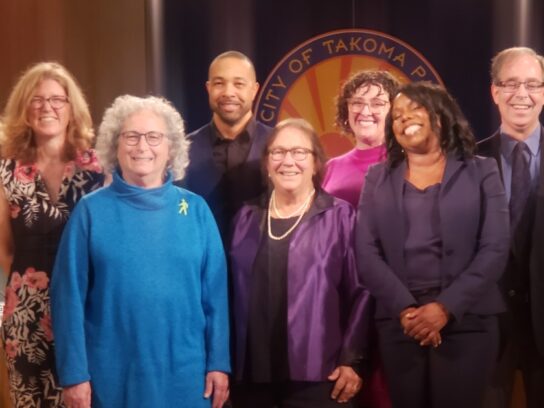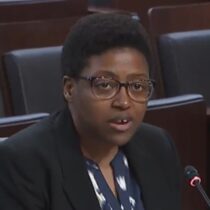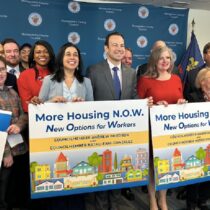
Takoma Park residents said goodbye to four councilmembers and welcomed in their newly elected slate Monday night.
Terry Seamans, who has been a fixture on council since 1999, opted not to run for reelection. Three other councilmembers – Shana Fulcher in Ward 1, Jason Small in Ward 6 and Randy Gibson in Ward 3 – were not reelected. All three were first elected in 2022.
The new councilmembers are Jessica Landman in Ward 1, Roger Schlegel in Ward 3, Kurt Gibson in Ward 4 and Amy Wesolek in Ward 6. Incumbents Cindy Dyballa in Ward 2 and Cara Honzak in Ward 5 faced no opposition and were reelected.
Mayor Talisha Searcy ran unopposed and was reelected. Dyballa was named mayor pro tempore.
“There will be a transfer of power, and it will be peaceful, and I am grateful for that,” said Honzak.
One resident who spoke during public comments noted, “The election showed people wanted a change.”
At times, campaigning was contentious. An instant runoff was needed in both Wards 3 and 6 before a winner was declared.
Schlegel noted that during the election, people talked a lot about housing. “People are insecure,” he said, adding, “Community first.”
“The fact that we are able to come out of this election season with our community values intact is a true testament to the city,” Searcy said.
Once the new members were sworn in, Searcy declared, “We are no longer running. Now is the time to lead.”
Following the meeting, Searcy said housing, the budget and taxes were the main issues during the election. These matters “can bring out people with different opinions,” she said.
She also noted that the number of open seats during the election brought out a lot of residents.
The turnover was unusual. No incumbents on Takoma Park council have lost their seats in 20 years.
In her second term, Searcy said, “Housing for me is a priority,” adding, “Our housing stock is one of the lowest” in Montgomery County.
The city needs to address housing, not just for those who qualify for affordable housing but the “missing middle,” the people who have incomes above federal poverty guidelines but are not millionaires, she said.
Mayor Talisha Searcy is sworn in for another term. @mymcmedia @TakomaParkMD pic.twitter.com/M1Lu48Ei84
— suzanne pollak (@SuzannePollak) November 19, 2024
The certified results of the 2024 #TKPK City Election are now available! Check out the winners for the Mayor and City Council election contests below ⬇️
For the full election results, view the City election webpage: https://t.co/zRNYIWjgCI pic.twitter.com/h7Dy4bjpdm
— TakomaParkMD (@TakomaParkMD) November 14, 2024


Comments are closed.